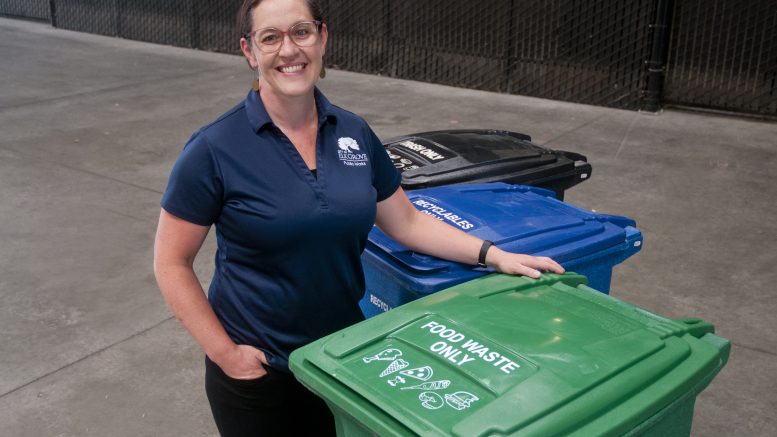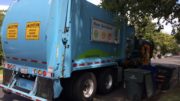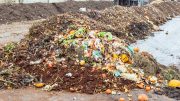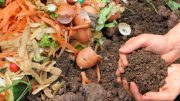Green bins support environmental education and behavior change
Most people don’t pay much thought to the gray, blue, and green rubbish bins sitting outside of Elk Grove businesses or lining the streets of residential neighborhoods during waste collection days. But where most people just see colorful trash cans, Kimberly Taylor sees powerful tools for environmental education and behavior change, the culmination of a lot of hard work and the opportunity to create significant, positive environmental change.
Taylor is the manager of Elk Grove’s Recycling & Waste Division and has a lot of insight as to why the bins are more than just receptacles for refuse, but an important component of implementing SB 1383—a state law aimed at reducing greenhouse gasses—and encouraging people to put food waste in their green bins.
“In Elk Grove we’re working on educating and supporting residents to develop some new behaviors. We’re trying to get people in the habit of putting their food waste into their green carts instead of in the garbage and sorting that organic material out from their trash.”
Kimberly Taylor, Manager, Elk Grove Recycling & Waste Division
“The main push of 1383 is to reduce the amount of food waste and other organic materials that are going into the landfills and producing methane,” Taylor explains. “In Elk Grove we’re working on educating and supporting residents to develop some new behaviors. We’re trying to get people in the habit of putting their food waste into their green carts instead of in the garbage and sorting that organic material out from their trash.”
The law charged California’s Department of Resources Recycling and Recovery (CalRecycle) to create a state-wide color guideline for waste collection bins, and Taylor says the city is in its second year of rolling out the new carts.
“That may sound like a small thing, but with over 50,000 residential households, ensuring that continuity between carts and colors was a big initiative,” Taylor says. “SB 1383 requires specific colors for waste collection containers statewide: trash containers must be gray or black, organics containers must be green and recycling container, blue.”
Taylor says the potential benefits are well worth the effort: “My background is in environmental education and behavior change so I know from experience that it’s very hard to make it happen, especially when there are barriers,” she says. “In this case, separating that material can be stinky and wet and yucky, which is a real barrier. Figuring out easy ways to address that, and to support folks and help normalize the separation of organics is a really important area of work for us, and for a lot of cities in California.”
Last spring, the city rolled out special bins for city events, which Taylor lauds as another big step. She says city staff worked closely with Republic Services—which provides trash collection in Elk Grove and partners with the city on other SB 1383-related environmental efforts—to develop the bins in the three-color system. The event bins have signage on all sides with pictures and language that show what waste is appropriate for each bin.
“It’s good for residents to see the same behaviors they’re being encouraged to practice at home happening at events in public places in the city of Elk Grove,” Taylor says. “We’re walking the talk.”
Taylor said she recently participated in an organic waste audit alongside Republic Services staff where she “literally dug through a sample of material that Elk Grove residents are putting in their green carts.” She found mixed results indicating some improvement, but that there is still work to be done.
“Contamination [non-organic materials] was really low, which is great, but I saw that food waste amounts were also very low. It was predominantly green waste, yard clippings and that kind of material,” she says. “So, my sense is there is still a lot of opportunity to help Elk Grove residents develop better behaviors.”
For more information about organic recycling in the city of Elk Grove, go to www.elkgrovecity.org/recycling-and-waste/organic-recycling.






























